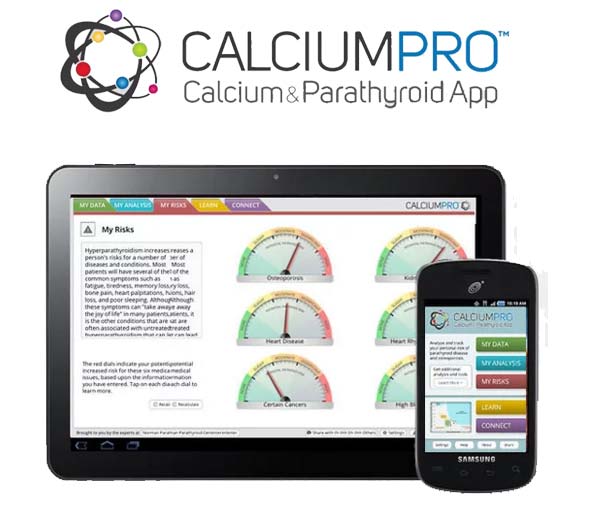Readers... Please note: Low calcium and hypoparathyroidism is rare, and almost always happens after a person undergoes thyroid or parathyroid surgery and the surgeon mistakenly removed all of their parathyroid glands. THE VAST MAJORITY OF THIS WEB SITE IS DEDICATED TO HYPERPARATHYROIDISM... TOO MUCH CALCIUM IN THE BLOOD WHICH IS DUE TO OVER ACTIVE PARATHYROID GLANDS... the OPPOSITE of hyp0parathyroidism which is discussed on this page. If your calcium is high, then you have hypERparathyroidism. This page is ok to read... because it shows how important it is to pick the right surgeon with lots of experience. But if your calcium is high, then this is NOT the first page you should read... go the the Home Page and read about hypERparathyroidism.
This is the SECOND page on hyp0parathyroidism on this web site... You may want to read the FIRST PAGE of hypoparathyroidism first, to get a background, and then come back here. This page is about HYPOPARATHYROIDISM CAUSED BY A SURGEON.
Surgical Hypoparathyroidism
(Hypoparathyroidism following thyroid/parathyroid surgery)
Introduction:
Hypoparathyroidism is a medical condition is caused by a surgeon removing all four of a patient's parathyroid glands. This is a terrible complication of surgery performed on the thyroid or parathyroid glands, and its occurrence should be near zero. It can cause very significant medical problems and can be so severe as to make a person's life quite miserable.
Surgery of the thyroid and parathyroid glands can be quite tricky. The parathyroid glands have the most variable anatomy in the body. Because of this, even the most experienced thyroid surgeons in the world could, on occasion, make the mistake of destroying or removing all of a patients parathyroid glands. Unfortunately, as will be discussed throughout this paper, the chance of this life-changing complication occurring can be over 1000 times higher when the operation is performed by an inexperienced surgeon.
The "acceptable" rate of a surgeon causing hypoparathyroidism during an operation on the thyroid or parathyroid glands is about 1% or less, as reported in the medical literature. The reality, however, is much different and very dependent upon the skill and experience of the surgeon. To publish a scientific paper in the medical literature, a physician must have enough experience in the field that allows him/her to accumulate sufficient data that is worthy of publication. Accordingly, only surgeons that have done a lot of thyroid or parathyroid surgery have enough patients that they have something to write about. It follows that a surgeon that performs a couple of thyroid or parathyroid operations per year will never accumulate sufficient data to allow him/her to publish. Thus, the "acceptable" rate of hypoparathyroidism following thyroid/parathyroid surgery of 1% is the rate of very experienced surgeons. Those surgeons who are inexperienced and have bad complications clearly do not write journal articles telling the world about their poor outcomes.
This is the largest study of surgical hypoparathyroid patients in the world. We worked with the Hypoparathyroidism Association (www.hpth.org) to collect data on over 200 patients who were made hypopara because of surgery on their thyroid or parathyroid glands. As we will show here, almost every patient with this complication was operated on by a surgeon that does NOT perform parathyroid or thyroid surgery more than once per month. These are very inexperienced surgeons and their inexperienced is directly related to the occurrence of this problem.
Patient Demographics.
In this study of 215 patients with surgeon-induced hypoparathyroidism, the average age was 42 years and 90% were female. 80% were operated on for thyroid disease while 20% were operated on for parathyroid disease. This makes sense, since thyroid surgery is much more common than parathyroid surgery and both thyroid and parathyroid disease are 3 times more common in females.
Surgeon Experience.
We contacted each surgeon or their office manager and established the number of parathyroid or thyroid operations performed by that surgeon in the past 2 years. Every patient who developed hypoparathyroidism had a surgeon that performed thyroid/parathyroid surgery less than twice per week. Ninety Five percent (95%) of the surgeons who caused this performed less than one thyroid/parathyroid operation per week. 85% of the surgeons performed this operation less than once every two weeks, 65% performed this operation less than once per month. There were no patients with hypoparathyroidism that had a surgeon who performed more than 150 of these operations per year.
Surgeons that performed between zero and five thyroid/parathyroid operations per year had a 9% chance of making their patient hypoparathyroid. The chance of this happening decreased to 5% when the surgeon performed 25 of these operations per year. It was not until the surgeon performed 150 or more thyroid/parathyroid operations annually that the rate of hypoparathyroidism decrease to the "acceptable" rate of 1% or less.
The experience of the surgeon can also be seen when the duration of the operation is examined. Surgeons that perform a particular operation frequently will usually become much faster and efficient. Over 85% patients who developed hypoparathyroidism following their operation had an operation that lasted 3.5 hours or more, with 65% having an operation that lasted 4.5 hours or more. As a comparison, it typically takes the author of this study (Dr Norman) an average of 55 minutes to perform a total thyroid removal and an average of 17.8 minutes to perform a parathyroid operation (he has performed nearly 8,000). Clearly the most inexperienced surgeons take much longer to perform the operation, and in doing so, have a much higher incidence of killing (or inadvertently removing) all of the parathyroid glands.
Associated Complications
The second major complication associated with surgery of the thyroid or parathyroid glands is injury to the voice box nerve. This nerve is called the "recurrent laryngeal nerve" and there is one nerve on each side of the neck, just behind the thyroid and immediately adjacent to the upper parathyroid glands. If this nerve is damaged, the patient cannot talk except in a very slight whisper. If BOTH of the nerves are injured, the patient must have a tracheostomy in order to breathe. The "acceptable" rate of injuring this nerve is 1%, however, as stated above, the rate of this complication is directly related to the experience of the surgeon. In this study, 54% of patients who were made hypoparathyroid ALSO had an injury to the voice box nerve. In 11% the injury was permanent (they can't talk well for the rest of their lives), and in 4% the injury was on both sides so the patient had to get a tracheostomy. As a comparison, the author of this study (Dr Norman) performs approximately 1800 of these operations annually, and has never had a permanent injury. Surgeons who don't do an operation very often have a MUCH higher rate of complications, and often have SEVERAL complications. These complications are often life-changing.
Patient / Surgeon Interaction.
Over 1/2 of patients who were made permanently hypoparathyroid by their surgeon never asked their surgeon about their experience in performing this operation. Just over 55% said it never occurred to them to ask the surgeon "do you do this type of surgery very often?". and thus had no idea that their surgeon did NOT do this operation often or ever! Within two weeks of the operation, 61% of patients found out that their surgeon was not experienced in this type of surgery and that their surgeon did very few of these operations. Another 26% found out a few months later when they went to a new doctor to get treated that their doctor was not the best choice even in their home town!
Another interesting finding was that when we asked surgeons about their experience performing thyroid/parathyroid operations, nearly every surgeon overestimated the number of these operations that they performed on an annual basis. When the surgeon's estimate of his experience in the past two years was compared to the actual number as reported by his office to the insurance companies for payment (the real number of these operations they actually performed), we found that the surgeon OVER ESTIMATED the number of thyroid/parathyroid operations by two fold or more in nearly 55% of all cases. In other words, most surgeons would tell us how many operations they performed, only to find out that his office records showed he/she performed less than half that many.
Sixty percent of patients said that the possibility of getting hypoparathyroid was never discussed prior to their operation their surgeon never mentioned it. The bottom line: patients never asked their surgeon if he/she was experienced in performing the operation and they paid a very dear price. If a patient did ask the surgeon, in over half of the cases the surgeon exaggerated the number of these operations they perform by two-fold or more.
Patients in this study were asked to tell us how their surgeon explained to them that they had zero parathyroid glands left, and that they have a complication called hypoparathyroidism. 61% said that their surgeon NEVER told them what was going on and never told them that the problem was due to the mistaken removal of all of the parathyroid glands'some other doctor had to explain what was going on and why they were so sick. 27% said that the surgeon did some explaining, but not much, and the final 11% said their surgeon was very good at explaining what happened and why. When these patients asked if they were pleased with how their surgeon communicated with them, 65% said "not at all", while only 8% said "yes, he/she has been a great communicator". Finally, when asked about their feelings toward the surgeon that caused their hypoparathyroidism, 58% said they were very angry with the surgeon, 30% said they were indifferent, and less than 10% said they still liked their surgeon a lot.
How Hypoparathyroidism Affects Patient's Lives
Calcium and Vitamin D Requirements.
Patients who have had all of their parathyroid glands removed or destroyed will require high doses of calcium and Vitamin D every day for the rest of their lives. Almost all patients in our study are required to take 4 or more calcium pills per day. Two-thirds (67%) have to take 5 or more calcium pills per day, and 25% have to take 8 or more calcium pills per day. Almost all patients take at least 2 Vitamin D pills per day, with 1/3 taking 3 or more per day. Thus, most patients who have hypoparathyroidism must take 8 or more pills per day in order to carry on the daily functions of life.
Despite taking these pills, 45% of patients say they still get symptoms of low calcium at least once per day. The most common symptoms reported by these patients are: fatigue (77%), hand cramps (68%), mental confusion (43%), and anxiety/fear (36%). One third of patients state that they get these symptoms once or twice per week, while only 5% say they rarely or never get these symptoms.
Work and Employment
Having hypoparathyroidism often makes people feel bad frequently enough that nearly 25% say they cannot work and have become unemployed. Of those still working, 72% said they had to change jobs because of concentration abilities or other issues related to symptoms (can't teach school, can't drive a truck, etc). 65% of patients say they miss 2 weeks or more of work per year more than they ever did before. One third stated that their employer doesn't understand their issues and why they are sick on a frequent basis.
Personal Interactions
A minority of patients say their family "understands" how they feel and their family has been great. However, 78% say their family and/or friends "simply don't get it". Just over 40% have been put on antidepressants. Two thirds say that hypoparathyroidism and the symptoms it causes have put significant stress on their relationship, with 8% saying this ailment is directly responsible for the breakup of their marriage. Clearly, patients with hypoparathyroidism feel poorly and this puts significant stress on their interactions with others.
Seeing Doctors for Ongoing Care
Less than 10% of all patients with hypoparathyroidism say their disease is managed well enough that they never have to go to the emergency room to receive IV calcium. Almost half of patients make one ER visit per year, while 25% make 3 or more ER visits per year.
Having hypoparathyroidism is associated with a dramatic increase in the number of doctor visits per year. Only 20% said they were not referred to a new doctor to help manage the problem, while 30% said they have 3 or more NEW doctors that they have seen to help manage this problem. Importantly, 61% said that even their endocrinologist doesn't understand their symptoms fully, and state that their doctor is often more interested in their lab (calcium) values instead of how they actually feel. One third of patients with hypoparathyroidism are now required to see an endocrinologist every 1-2 months, one third see their doctor every 3-5 months, and one third see their doctor every 6-12 months. Two thirds of patients have to get their blood calcium checked every 4 months or less; one third gets their blood tested every month.
Summary of Surgeon-Induced Hypoparathyroidism
Surgeon-induced hypoparathyroidism is a serious medical condition that is life-long. Patients with hypoparathyroidism are required to take lots medications, yet most of them continue to get symptoms of low calcium daily or weekly. Hypoparathyroidism takes a serious toll on the interpersonal lives of these patients at home and at work, and has significant costs associated with multiple doctor visits and lab tests.
Surgeons who perform more than 150 thyroid/parathyroid operations per year are extremely unlikely to cause hypoparathyroidism, while those that perform fewer than 20 of these operations annually have a 10% chance of causing this or another serious complications. Surgeons who perform less than one thyroid/parathyroid operation per month have a risk of causing permanent hypoparathyroidism nearly 1000 times higher than the few elite surgeons who perform over 500 of these operations per year. Patients usually do not ask their surgeon about his/her experience, and when asked, surgeons almost always exaggerate their expertise, with half of the surgeons exaggerating the number of these operations they perform by more than two fold.
Reducing the incidence of hypoparathyroidism lies in the hands of the patients. Few surgeons will refuse to perform an operation that is referred to them because they feel that they lack the experience to to a good job. Patients must be educated about hypoparathyroidism as a life-changing complication PRIOR to undergoing surgery on their thyroid or parathyroid glands. Going to the "local surgeon" that your doctor sent you to is often not the best choice. Patients must check on the qualifications and experience of their surgeons if they expect the lowest possible complication rates. Having a nice diploma on the wall isn't enough! Patients must be informed and must take charge. Patients must ask hard questions of their surgeons or the consequences could be life-changing.
What to read next
- If you want to know more about hypoparathyroidism, then make sure you read our FIRST page on hypoparathyroidism. Click Here to read the first page.
- You can visit the Hypoparathyroid Association Website by clicking here.
- How to become our patient
IMPORTANT: If you are reading these pages because you or someone you know is contemplating parathyroid surgery, then please read the page on Cure Rates and Complication Rates for different types of parathyroid surgery. This page shows how the experience of the surgeon has a great bearing on how often a patient develops a problem such as hypOparathyroidism. It also shows how mini-parathyroid surgery has a near zero chance of causing hypoparathyroidism. Pick your surgeon well! A bad result after parathyroid surgery can be really bad!




